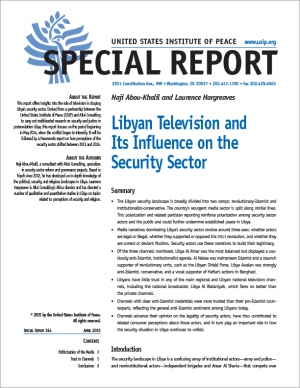By Libya Herald reporter.
Tunis, 3 May 2015:
The report assesses the popular legitimacy . . .[restrict]of Libya’s current security providers and identifies their vectors of local, religious, and legal legitimacy to better understand Libyan needs in terms of delivery of security services.
‘’Libya’s security sector landscape is characterized by a myriad of security actors of differing political orientations and areas of geographic control and by the relatively minor role of prerevolutionary security institutions, such as the National Police and National Army’’.
‘’The two key sector dimensions are the nature of the actors’ de jure command and control lines and religious-political orientations’’.
‘’One of the main causes of the fragmentation within the sector is the struggle between those who support the substitution of institutional actors by Islamist-leaning revolutionary brigades and those who want to exclude them’’, the report explains.
‘’Libyans still seek state-sponsored security forces. Support for the National Police dropped to 19 percent in the summer of 2014, yet 52 percent support its being in charge of security provision’’, reveals the report.
‘’Short-term security solutions have had little impact on citizen desires to see development of a modern and institutionalized police and army. Libyan Shield Forces and other post-revolutionary security actors are unpopular and considered by a small minority to be part of the National Army’’.
‘’Four conclusions are clear: Libya’s security landscape has further fragmented in 2014, public confidence in the security situation has decreased, support for institutional actors remains strong, and auxiliary actors have become more visible’’, concludes the report. [/restrict]








